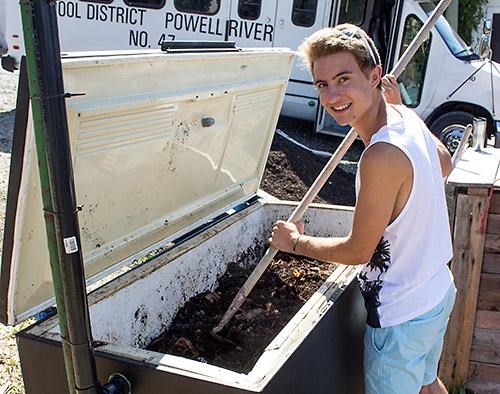Youth from around the province participated in a one-of-a-kind program in Powell River this summer, a summer camp that emphasizes ecology, leadership and pluralism.
Between July 20 and 25, aboriginal and non-aboriginal youth came to Powell River from around the province for LEAP Dreamcatcher, an experience for youth registered in the Duke of Edinburgh Award and wanting to complete their gold residential project.
It was a first for School District 47’s Outdoor and Ecological Learning (OEL) department which partnered with the Powell River Diversity Initiative (PRDI), the Duke of Edinburgh Award and both Klahoose and Tla’amin (Sliammon) first nations to present the unique six-day outdoor and leadership focused experience. PRDI was awarded an InSpirit Foundation pluralism grant to help operate the camp in 2013, and it was originally planned for July 2014, but last year’s province-wide teachers strike put the camp on hold.
Ryan Barfoot, OEL coordinator, said that the idea for Dreamcatcher was born after administrators at Duke of Edinburgh Award noticed that many of their applicants to the award had had previous experience in Barfoot’s other youth programs, Coast Mountain Academy, LEAP (Leadership, Ecology, Adventure Program) and Sustainability Toolbox.
Barfoot brought on Ryan Pielle, who was happy to be able to return to Powell River after a year away at school in Victoria at Camosun College as lead programmer. Graham May, who has been working with Barfoot this summer also helped bring together the tapestry of events over the week which included hiking and plant identification, paddling on Powell Lake, Sliammon drumming and dancing, learning about permaculture with Ron Berezan, as well as discussions around gender and culture identity, journalling and nature connection activities and an activity designed to help students learn more about the lasting legacy of colonialism on first nations peoples in Canada.
Devin Pielle, Ryan’s sister, led the group of 21 youth in the Blanket Exercise, a workshop that she learned at an aboriginal youth workshop in Winnipeg. “It’s an interactive exercise which teaches the true history of first nations people in Canada,” Devin said, “history that is not necessarily taught in the schools.” The exercise was developed following the 1996 report of the Royal Commission on Aboriginal Peoples and helps participants understand why there is the need for reconciliation and what steps can be taken to move forwards in creating new relationships.
The exercise takes participants, both aboriginal and non-aboriginal, through the period of first contact with white settlers to today. “It can be emotionally heavy,” she added, so she asked Tla’amin elder John Louie to help provide support and brush everyone off with cedar boughs when the exercise is complete. “We don’t want everyone to leave with all those negative feelings.”
May said that he was honoured to participate in the hosting the one-of-a-kind camp and proud that Powell River had been selected for the international project which highlighted its rich civil society, beautiful land, and strong tradition of environmental education.



